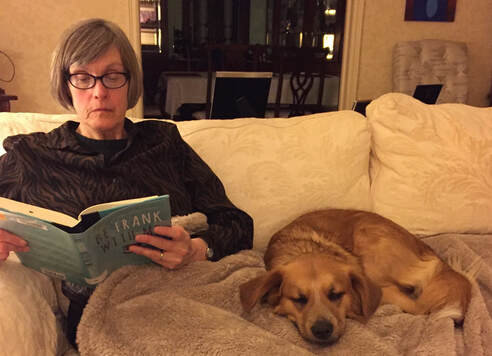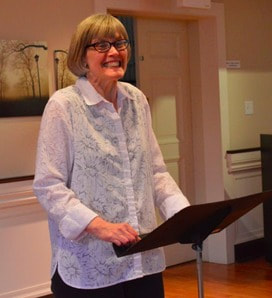Liz Hill

Liz Hill grew up in Staten Island, New York, the setting for her novel The Last Brass Ring. Since leaving New York in the 1980s, she has lived and worked in six other states: New Jersey, Colorado, California, Minnesota, Ohio, and North Carolina. She and her husband Matt Alspaugh, a Unitarian Universalist minister, moved to Jalisco, Mexico in 2017, when Matt became pastor of the Lake Chapala UU Fellowship. Liz and Matt now live part-time in western North Carolina and part-time in Mexico. They are not always in the same place at the same time, which reminds them of their early years together when corporate business travel was just part of life.
Liz spent her work life writing business communication for corporate and nonprofit clients, where she learned to understand engineers and technicians. Her years as an independent contractor taught her to troubleshoot her own technology issues. These days she enjoys acting as Tech Support to friends and family, unraveling the mysteries of apps, clouds, passwords, uploads, and downloads.
Liz enjoys walking (and reading with) her dog Rosie, a retriever mix, slow-hiking with Matt, and attending group exercise classes. She enjoys kids and has spent many happy hours in church nurseries and youth rooms and with her "little" in Big Brothers Big Sisters. She’s also a certified scuba diver, though she quickly abandoned that sport when she realized that coming eye-to-eye with sea creatures was the whole point. She crochets at lightning speed but she must re-watch Casting On and Binding Off on YouTube every time she tries to knit. She spends a lot of time on the telephone with distant friends and family, and likes to meet local friends “for coffee” -- though she never touches the stuff, preferring instead to drink gallons of black tea (hot or iced) every week.
Writing and Community Work

Liz is the co-author of three novels for young adults, written in the era of Goose Bumps. Her mystery novels are officially out of print, and some of them are also officially out of date (Web of Death, for instance, which featured a then-cutting-edge plot revolving around mysterious anonymous emails).
Liz enjoys writing plays and watching imagined characters come to life on stage. Her first one-act play By the Book was produced at Youngstown Playhouse. The story was inspired partly by tech writing gigs for cable and telecom companies, and partly by the endlessly fascinating people and landscape of Youngstown Ohio. Another one-act play Easter Babka involved two people unwittingly set-up by matchmaking nuns. It was featured in staged readings at Pittsburgh New Works Festival, and workshopped at Hendersonville Theatre.
Liz has kept a journal since 1970; plain spiral notebooks is her preferred medium. As part of her training as a spiritual director some years back, she reviewed the journals and burned all but the last three years’ worth. The idea of burning shocks most fellow writers, but the process led Liz to develop a workshop called Un-Journaling, which guides people in reviewing their journals as a way of reflecting on their lives.
Liz is a graduate of the Haden Institute’s Spiritual Director program. For more on that you can see the Spiritual Direction page on this web site.
Her maternal grandfather, Lt. Col. Jacob Mary (1884-1970) kept a diary in the early 20th century. When Liz inherited these diaries, she used them to create a book with family photos, historical notes, and observations from his daughters and grandchildren. Jacob was a gentle, honest family-oriented man. The project was a labor of love and a pleasure to complete. You can order a copy from Lulu.com here.
Liz has volunteered in a variety of leadership roles for literary, church, and community nonprofits. She is a co-founder of Lit Youngstown, a Literary Arts nonprofit, and has served on the board of Rocky Mountain Fiction Writers (RMFW). For Lit Youngstown she coordinated an oral history project that resulted in publication of Phenomenal Women: Twelve Youngstown Stories. This video explains the project and has some footage from the publication party. For RMFW she served as President, Conference Chair, and coordinated publication of their first fiction anthology, which is now an ongoing publication that has included several of her own stories.
From her earliest memory, Liz was a writer, and no matter her work, school, or volunteer schedule, she is never without a literary project. However, there is a conundrum: she also loves being part of a community at work, at church, in her neighborhood, or in writers’ groups. Communities are fun and rewarding places where she has made lifelong friends. But a reliable and organized person is often asked to lead the team or take on important tasks, which takes time away from actual creative pursuits.
There’s an old expression: “What you feed, grows; what you starve, dies.” Without regret, Liz understands why her life story is as much about working and volunteering as it is about creativity and publication.